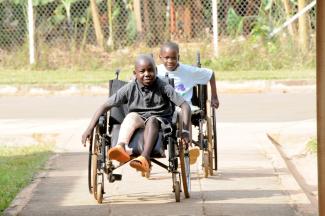Social cohesion
Inclusive future

One billion of the world’s people are women, men, girls and boys with disabilities – this means one in seven persons on this globe. According to the UN at least 80 % of that billion live in low-income countries, where they make up a disproportionate percentage of the poorest sections (see D+C/E+Z 2014/08 – 09, focus section, pages 318 ff.). With the adoption of the Convention on the Rights of Persons with Disabilities (CRPD) in 2006, the issue has been officially recognised as being crucial for global development. A global movement for inclusive development has contributed to putting it on the agenda all over the world.
Inclusion is an indispensable goal for several reasons:
- From the economic perspective, the exclusion of persons with disabilities from employment and productive life creates a huge burden for governments and societies. It prevents people with disabilities from tapping their full potential and contributing to the economic and social progress of society.
- From the humanitarian perspective, disaster-management strategies and relief agencies tend to overlook persons with disabilities even though they, and their families, are especially vulnerable.
- From the developmental perspective, disability must be tackled explicitly as a crosscutting issue, so development does not bypass persons with disabilities and their organisations. Including persons with disability in education, employment, health care and nutrition should have been part of the Millennium Development Goals, however this was missed.
Policy makers, civil society and private-sector companies must ensure the inclusion of persons with disabilities in all spheres of life. They must:
- respect and protect the human rights of all persons with disabilities,
- make provisions and adapt services to ensure that persons with disabilities fully benefit from development and humanitarian relief programmes and
- ensure active participation and agency by all persons with disabilities.
Rising to these challenges is not a trivial matter, and a recent CBM publication offers guidance. Its title is: “The Future is Inclusive. How to Make International Development Disability-Inclusive”. This publication starts CBM’s new “Series on Disability-Inclusive Development” and is available in English and German at all major book sellers and can be downloaded from CBM homepages.
The publication elaborates five principles which need to be put into practice. The five principles are:
- Accessibility: People with disability need access to buildings, public infrastructure, transportation, information and communication. Many physical obstacles block such access, but social attitudes all too often do so too. Accessibility is a prerequisite for full inclusion in society. In particular, accessibility must be taken into account when planning for emergencies and humanitarian relief. Persons with disabilities are particularly at risk during natural disasters and violent conflicts. Many are unable to access temporary emergency shelters, water and sanitation or food.
- Respect for inherent dignity: International human-rights law recognises every individual’s right to dignity, and so do global development frameworks. This is the key to achieving justice, equity and prosperity. The inherent dignity of women, men, girls and boys with disabilities must be respected, for otherwise they will not be empowered to play active roles in their families and communities and take control of their own lives. Paternalistic and charitable attitudes must be overcome. It is necessary to raise awareness accordingly.
- Non-discrimination: Discrimination against persons with disabilities comes in many forms. Persons can be directly and indirectly discriminated, intentionally or unintentionally. Discrimination can be caused by individual, institutional and structural barriers. At the national level, equal opportunities for persons with disabilities must be ensured through the enforcement of non-discrimination laws and the implementation of appropriate policies. What non-discrimination and equality of opportunity mean in practice is that all persons with disabilities must be able to access buildings, institutions, services et cetera just like persons without disability.
- Full inclusion: Society must recognise how women, men, girls and boys with disabilities can contribute to social and economic development and help with the eradication of poverty. They must be enabled to participate fully in all spheres of life. This is a demand of human rights, that goes along with considerable financial benefits.
- Respect for diversity: The population of persons with disabilities reflects the diversity that is found throughout the world’s people. Persons with disabilities are women, men, girls and boys. They live in different geographic locations and come from a range of different racial and ethnic backgrounds, including indigenous people. Not only disabilities must be considered in mainstream development. All other forms of exclusion based on gender, age, ethnic or linguistic belonging and health status matter as well.
On the agenda
Women, men, girls and boys with disabilities face significant challenges. Far too often they are denied the options they need to create a safe, secure and sustainable life for themselves and their families. Their exclusion from many spheres of the communities they live in, significantly hinders the development of societies at large. However, things have begun to improve, and further change needs to be accelerated.
Inclusion is a principle that must apply to all development programmes and all humanitarian and disaster risk reduction activities, including those that focus on specific dimensions of poverty and marginalisation. Thus, global development actors must accept their obligation to fully involve persons with disabilities in their programmes. They must understand that, unless persons with disabilities are included in all spheres of life, progress on improving the lives of the world’s poorest people will be limited. When world leaders agree a new set of global development goals in September 2015, they must not neglect this crucial issue. Rather, they must make sure that the future is inclusive of everyone.
Priska Gronenberg is coordinating CBM’s “Series on Disability - Inclusive Development”.
priska.gronenberg@cbm.de
Mary Keogh works with CBM as a consultant on disability-inclusive development.












